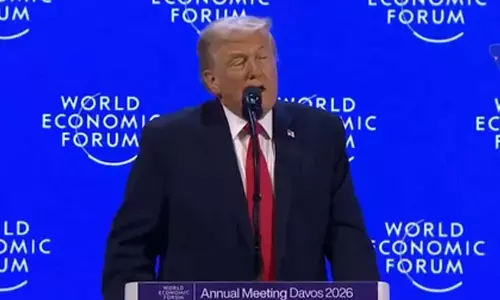Hafiz Saeed's conviction a designed verdict

The verdict on terror financing cases involving Jamaat-ud-Dawa (JuD) supremo Hafiz Saeed is merely laughable at the best.
The verdict on terror financing cases involving Jamaat-ud-Dawa (JuD) supremo Hafiz Saeed is merely laughable at the best. Pakistan might claim it as a major development as the country tries, reportedly, to dismantle the active militant infrastructure.
Saeed, the driving force behind Lashkar-e-Taiba who went on to form JuD later after the former was banned, is a personification of terror. He conceived terror, nurtured the same and spread its tentacles all across, particularly against India with his Kashmir centric terror plot.
He has poisoned the young minds of Kashmir against India that led to a bloodbath. Hundreds of lives were lost in the process both that of the civilians and that of Indian security forces.
The Pakistani court's sentence against the founder of the Lashkar-e-Taiba armed group is on a terror financing case. Saeed was convicted and sentenced on two counts by a court in the eastern city of Lahore on Wednesday.
He was sentenced to six months' imprisonment for being a member of a "proscribed organisation" under Pakistani law, and another five years for a charge related to "illegal property". Saeed was, of course, the driving force behind Lashkar-e-Taiba — before dissociating from it when it was banned to go on to establish JuD.
Formed as the US-backed Afghan jihad was winding down in the late 1980s, the Kashmir-centric Lashkar became one of the most violent and well-organised militant groups in South Asia. The lawyer of the veteran jihadi leader, who along with an aide was convicted by an anti-terrorism court, says they will appeal the judgement in the Lahore High Court.
He is not convicted, however, for the Mumbai attacks, or Pulwama or Uri or Pathankot, or for that matter for any attack on Indian soil. In fact, Saeed's counsel argued that his client was convicted for no other reason than due to FATF "pressure" ahead of its upcoming meeting.
He was right on that count. Saeed was seen as a threat to Pakistan vis a vis the FATF and the international community. One cannot rule out Chinese intervention too. It could have advised Pakistan to get him in a safe house of government custody.
So, if there is a realisation in Pakistan that Saeed should be disowned and packed away, it is only because of the UNSC condition that is rearing to fix Pakistan into its blacklist.
It does not appear that there is a growing realisation in the government and security establishment that nurturing or ignoring such violent actors is a dangerous policy, or that the time has come to put an end to such activities.
Pakistan should realise, if there is even an iota of sincerity, that using militant actors as tools of foreign policy is a failed strategy. This never seems to be the understanding at the top in Islamabad.
If Imran Khan claims on the world stage that he has successfully dealt with it by arresting Saeed, it will only come with the approval of the Pakistan Army which is the real government in the country. Saeed's conviction, at the best, is yet another designed bluster.














